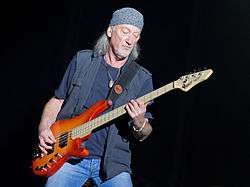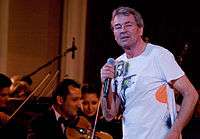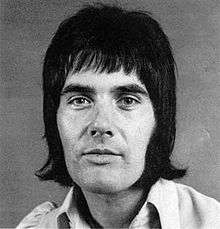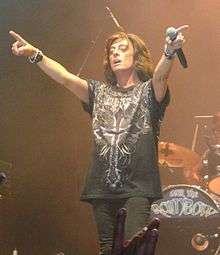List of Deep Purple band members

Deep Purple are an English hard rock band from Hertford, Hertfordshire. Originally known as Roundabout, the group formed in March 1968 featuring vocalist Rod Evans, guitarist Ritchie Blackmore, bassist Nick Simper, drummer Ian Paice and keyboardist Jon Lord.[1] This first lineup of the band, known as Mark I, released three albums within the space of a year – Shades of Deep Purple, The Book of Taliesyn and Deep Purple – before Evans and Simper were fired from the band at the request of Blackmore and Lord.[2] Mark II of Deep Purple saw Ian Gillan and Roger Glover replace Evans and Simper, respectively, in the summer of 1969.[2] This lineup of the band has since been identified as their most successful, with their next four albums reaching the top four of the UK Albums Chart, including number-one albums Fireball and Machine Head.[3]
After the release of seventh studio album Who Do We Think We Are in early 1973, Gillan left the group due to creative differences with Blackmore, and was followed shortly by Glover.[1] Deep Purple, Mark III were formed later in the year with the addition of vocalist David Coverdale and bassist and vocalist Glenn Hughes.[2] This lineup released two studio albums – Burn and Stormbringer, both in 1974 – before founding member Blackmore left the band, reportedly due to the new influences of funk rock presented by Coverdale and Hughes.[2] Mark IV of the band, featuring Tommy Bolin in place of Blackmore, released their only album Come Taste the Band in 1975, before breaking up the following year.[2]
After almost ten years disbanded, Deep Purple reformed in 1984 with the Mark II lineup of Gillan, Blackmore, Glover, Paice and Lord.[1] However, after just two albums – 1984's Perfect Strangers and 1987's The House of Blue Light – Gillan left the band once again following tensions with Blackmore.[2] He was briefly replaced by Joe Lynn Turner, who had performed with Blackmore in Rainbow, before returning again just a few years later.[1][2] Blackmore departed again in 1993 and was replaced briefly by Joe Satriani, before current guitarist Steve Morse joined in his place permanently in 1994 to begin Deep Purple Mark VII.[2] Another original member, keyboardist Lord, departed in 2002, leaving only drummer Paice as the only constant member; Lord later died of pancreatic cancer in 2012.[1][1] Lord's replacement was Don Airey.[1]
Members
Current
| Image | Name | Years active | Instruments | Release contributions |
|---|---|---|---|---|
 |
Ian Paice |
|
all Deep Purple releases | |
 |
Roger Glover |
|
bass |
|
 |
Ian Gillan |
|
| |
 |
Steve Morse | 1994–present | guitar | all Deep Purple releases from Purpendicular (1996) to present |
 |
Don Airey | 2002–present (touring member 2001–2002) |
keyboards | all Deep Purple releases from Bananas (2003) to present |
Former
| Image | Name | Years active | Instruments | Release contributions |
|---|---|---|---|---|
| Jon Lord |
|
|
all Deep Purple releases from Shades of Deep Purple (1968) to Abandon (1998) | |
 |
Ritchie Blackmore |
|
guitar |
|
 |
Rod Evans | 1968–1969 | vocals |
|
 |
Nick Simper | 1968–1969 |
|
|
 |
Glenn Hughes | 1973–1976 |
|
|
| David Coverdale | 1973–1976 | vocals |
| |
 |
Tommy Bolin | 1975–1976 |
|
Come Taste the Band (1975) |
 |
Joe Lynn Turner | 1989–1992 | vocals | Slaves and Masters (1990) |
 |
Joe Satriani | 1993–1994 | guitar | none |
Timeline

Lineups
| Lineup | Years | Members | Studio albums |
|---|---|---|---|
| Mark I | 1968–1969 |
|
|
| Mark IIa | 1969–1973 (Classic lineup) |
|
|
| Mark III | 1973–1975 |
|
|
| Mark IV | 1975–1976 |
|
|
| Deep Purple disbanded between 1976 and 1984. | |||
| Mark IIb | 1984–1989 |
|
|
| Mark V | 1989–1992 |
|
|
| Mark IIc | 1992–1993 |
|
|
| Mark VI | 1993–1994 |
|
none |
| Mark VII | 1994–2002 |
|
|
| Mark VIII | 2002–present |
|
|
References
- 1 2 3 4 5 6 7 Ankeny, Jason. "Deep Purple: Biography & History". AllMusic. All Media Network. Retrieved 24 November 2015.
- 1 2 3 4 5 6 7 8 Rivadavia, Eduardo. "Deep Purple Lineup Changes: A Complete Guide". Ultimate Classic Rock. Diffuser Network. Retrieved 24 November 2015.
- ↑ "Deep Purple". Official Charts Company. Retrieved 24 November 2015.